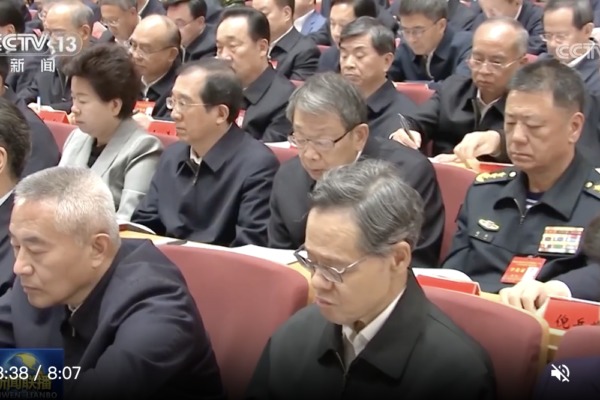At approximately 7:35 a.m. on November 18, 2024, the roof of an ice skating rink in Baicheng, Jilin Province, suddenly collapsed entirely, sending up a cloud of dust. (Video Screenshot)
[People News] On November 18, the roof of an ice skating rink in Jilin Province, China, collapsed, sparking widespread public concern. The rink, which was built at a cost of 50 million yuan, suffered the incident just three days after a newly opened supermarket in Yunnan experienced a floor collapse, causing customers to fall into the river below. Analysts believe that despite differences in the specifics of these cases, such recurring "shoddy construction projects" (豆腐渣工程) highlight serious lapses in the CCP government's regulatory oversight.
According to a report by Voice of America, at around 7:35 a.m. on the day of the incident, the roof of the Baicheng ice skating rink in Jilin Province, supported by a steel structure, partially collapsed with a loud bang. The resulting cloud of dust was visible from hundreds of meters away. The CCP's official media outlet, CCTV News, reported that the initial assessment of the cause pointed to "deformation of the steel roof structure, possibly due to construction quality issues."
State Media Calls for Thorough Accountability Investigation into the Incident
According to a report by Southern Weekly on November 21, the ice skating rink spans a total area of 4,369 square meters and had been in use since December 2019. It had become an important venue for sports and leisure activities for Baicheng residents. Fortunately, the collapse occurred early in the morning, and only two cleaning staff sustained minor injuries.
Ironically, this facility was initially designated as a key municipal project by local authorities to fill the gap in professional ice skating venues in the city. With a total construction cost of 52.06 million yuan (approximately $7.18 million), the city government emphasized "adhering to quality first and prioritizing safety."
Yet, less than five years after its completion, it collapsed catastrophically.
The report noted that the ice skating rink was constructed by Jilin Province Rongfa Construction Engineering Co., Ltd. However, industrial and commercial data show that as of 2023, the company had only 22 registered employees in its annual corporate report.
On Wednesday, November 20, China Youth Daily published an article with a striking headline questioning why the skating rink collapsed in less than five years and calling for accountability to be pursued "to the very end."
The article emphasized that no extreme weather was reported in Baicheng at the time of the incident, and the skating rink was far from reaching its designed service life. The construction company is undoubtedly responsible, but the failure to identify safety issues lies not only with the builder. The project would have had to pass through multiple checkpoints, from design to final inspection. Why were these safety problems not identified in time?
Investigation Delays and Censorship in Rink Collapse Case
The report also highlighted a similar incident in July last year when a gymnasium at a middle school in Qiqihar, Heilongjiang Province, collapsed, resulting in 11 deaths and 7 injuries. However, it was not until September this year that prosecutors brought charges against those responsible, and the case remains in the "accountability process."
Four days after the Jilin ice rink collapse, apart from a few media outlets calling for accountability, discussions on Weibo largely ceased after November 18, the day of the incident. Related hashtags, such as #JilinIceSkatingRinkCollapse# and #OfficialResponseToJilinIceRinkCollapse#, were labeled with notices stating, "Sorry, this topic's content is not displayed."
The incident has drawn comparisons to other high-profile collapses, including last year’s gymnasium collapse at Qiqihar No. 34 Middle School. In that case, construction materials like perlite were stored on the roof, and heavy rain caused the materials to absorb water and increase in weight, leading to the collapse. Similarly, in November last year, a sports venue in Jiamusi, Heilongjiang, collapsed, with officials attributing the cause to heavy snow accumulation on the roof.
This time, however, netizens in Jilin have voiced skepticism. A user named "Fat Monkey Legend" remarked, "They can’t blame the snow this time—Jilin hasn’t even had snow yet this year." Another user, "Grassland Blue" from Jiangsu, questioned, "They probably all took kickbacks, which is why the quality is so poor."
Civil Engineer: Construction Flaws Likely Behind Arena Collapse
Qiu Dachang, Vice Chairman of the Civil Engineering Association in New Taipei City, Taiwan, believes that based on the initial information available, the collapse of Baicheng’s ice skating rink is likely related to construction flaws. He noted that reviewing the original design plans, structural calculations, and construction records could help uncover the truth.
Speaking to Voice of America, Qiu stated: "The rink spans 60 meters in length and width. For a building with such a large span, the quality of construction must be extremely high. Even minor flaws could trigger a chain reaction, causing the steel structure to fail under its intended load and collapse instantly."
Another Taiwanese civil engineer, who chose to remain anonymous due to the sensitivity of the topic, pointed out that Heilongjiang and Jilin—both in China’s northeast—have experienced multiple gymnasium collapses in recent years. These regions are characterized by large seasonal and diurnal temperature fluctuations, meaning the thermal expansion and contraction of large steel structures must be precisely accounted for during the design process.
The engineer further explained that in Taiwan, projects of a similar scale must be designed by licensed civil or structural engineers and reviewed by an independent third-party organization. In contrast, many smaller or remote cities in China lack sufficient administrative and inspection resources. Additionally, many construction companies in China, especially in less developed areas, are state-owned enterprises. This results in a “left hand to right hand” situation, where government-funded projects are handed to state-affiliated contractors, making effective oversight and inspection even more difficult.
Yunnan Supermarket Floor Collapse Six Days After Opening, Mother and Daughter Fall Into River
Misfortunes often come in pairs—not only do official construction projects face accidents, but incidents in private establishments can sometimes be even more outrageous.
According to a report by Xiaoxiang Morning News, on November 15, part of the floor in a chain snack supermarket in Kunming, Yunnan, suddenly caved in, causing a woman and her 12-year-old daughter to fall into the river below the store. The pair were trapped under goods that had also fallen. The mother later described her terrifying experience, saying, "I felt like I was going to die here."
Shockingly, the supermarket had only been open for six days when the incident occurred. The operator has not responded to public concerns about whether the store was illegally constructed or how they plan to address the aftermath.
Qiu Dachang, Vice Chairman of the Civil Engineering Association in New Taipei City, suggested that the likely cause of the incident lies in the local government’s lax enforcement of laws and regulations, allowing businesses to construct buildings without proper safety oversight.
Wang Weiluo: Collapse Incidents Reflect Government Failures
Dr. Wang Weiluo, a hydraulic engineering expert based in Germany, told Voice of America that the collapse of Baicheng’s ice skating rink is most likely due to substandard steel materials. He cited previous incidents in Germany where low-quality Chinese steel caused issues in bridge construction.
However, considering these recent accidents as a whole, Wang argued that they reveal a broader systemic failure in social management and governmental oversight.
He explained that the construction of a public skating rink would typically require comprehensive approval processes involving the local municipal government, including the powerful Development and Reform Commission and various urban planning departments. At its core, Wang suggested corruption and the embezzlement of construction funds as the likely reasons behind the poor construction quality.
In May this year, China’s State Council, along with the Ministry of Natural Resources and the Ministry of Housing and Urban-Rural Development, announced the completion of the First National Comprehensive Risk Survey Report on Natural Disasters. This effort reportedly mobilized over 2.6 million people to investigate 354 million buildings across urban and rural areas, claiming to provide a thorough assessment of the nation’s construction inventory. Yet, these high-profile efforts failed to prevent collapses like these in the absence of any significant natural disasters.
Wang criticized the government, saying: "They (the Chinese government) claim to have established the world’s most comprehensive building database, focusing specifically on safety issues. However, they have never made this data public, such as identifying which buildings are unsafe. As a result, these efforts do nothing to prevent collapses like this."
Analysis: Root Causes of Accidents Point to Corruption and Lack of Press Freedom
Shen, the host of a political YouTube channel based in Toronto, Canada, believes that corruption is at the heart of these incidents.
While investigations into the accidents are ongoing and no definitive conclusions have been reached, Shen noted that the practice of subcontracting construction projects layer by layer for profit is an open secret among CCP officials and contractors.
What is most alarming, Shen observed, is that in the past, structural issues like leaks and peeling exterior walls typically surfaced after a decade or two. Now, structures such as the ice skating rink, operational for less than five years, and a supermarket, open for only six days, are collapsing. This indicates that the long-standing problem of "shoddy construction" (豆腐渣工程) has not only persisted but worsened.
Shen explained: "Unless there’s a natural disaster, which would indicate environmental factors, it’s clear this is a man-made issue. We can use process-of-elimination logic here. China has had this problem for a long time. When I was in school, TV programs constantly criticized shoddy construction."
Brisbane-based commentator Siling argued that the absence of press freedom in Chinese society is another underlying factor contributing to these repeated incidents.
One of the most ironic cases, Siling said, involves an incident where even state media reporters were targeted while covering substandard construction materials used in a high-speed rail project in Anhui Province. The reporters were physically attacked, their phones confiscated, and some were injured—an experience akin to what foreign journalists face in China.
Furthermore, the two recent collapse incidents, despite the lack of casualties, were quickly suppressed in both media and online discussions within days. This prevented a meaningful public reflection or debate.
Looking at the broader picture, Siling expressed concern over the CCP's handling of nationwide issues with poorly constructed and unsafe residential buildings. While the government has ordered local authorities to "ensure delivery of properties" (保交楼), projects rushed to completion under time and financial pressure are now frequently reported to have substandard quality. These protests and complaints are only shared through overseas independent media, as domestic discussions face severe censorship.
Siling remarked that such an environment inevitably increases safety risks.
Siling told Voice of America: "Revealing the truth in China has now become a high-risk profession. When such ironic situations occur, how can this society possibly establish a mechanism to correct its mistakes? There’s no one—or any independent third party—daring enough to stand up, seek justice, or disclose the truth."











News magazine bootstrap themes!
I like this themes, fast loading and look profesional
Thank you Carlos!
You're welcome!
Please support me with give positive rating!
Yes Sure!